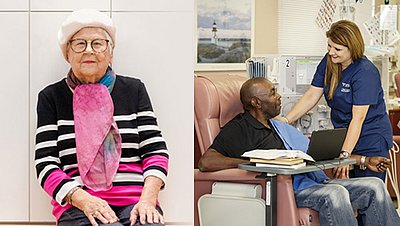Our patient stories and company features.
The Far-Reaching Impacts of the CONVINCE Study
When researchers began the CONVINCE Study, initial results of which were published in June 2023 in the New England Journal of Medicine, they sought to find ways to quantify the benefits patients might receive using high-volume hemodiafiltration (HDF) as compared to the standard of care, hemodialysis. Not only were the results promising with regards to HDF as a treatment method in reducing mortality rates, they also showed the unique role patient-reported outcomes (PROs) can play in medical studies for kidney patients and beyond.
Building compelling results
The CONVINCE Study began in 2018 with funding from the European Union’s Horizon 2020 research and innovation programme. The study took place in eight European countries, where HDF is more commonly available than other geographic regions, such as the United States. For over two-and-a-half years it followed more than 1300 participants, who were asked to complete surveys on their overall health, treatment, and well-being every three months. It provided solid results that particularly highlighted the way PROs can be used and implemented to show how persons with kidney disease view their own health over time.
The importance of PROs
Krister Cromm is Fresenius Medical Care’s director of person-centered outcomes Research and played a critical role in gathering and analyzing data from the CONVINCE Study. According to Cromm, “A patient-reported outcome is a way to measure health-related quality of life, which is an important measure that has been defined by the World Health Organization.”
According to Cromm, PROs can delve deeper into how patients feel about their health versus strict physiological measurements of health, such as whether a patient can walk up a flight of stairs, or specific measures like blood pressure and lab results. Physiological measurements are crucial to determining health, which is why they can sometimes overshadow the importance of PROs in patient care. PROs, however, can tell us more about how a patient feels with a chronic disease and can lead to meaningful conversations about optimizing care and choosing the right treatment.
“There are mental health components, such as measures about feeling depressed or anxious,” Cromm explains. “There are also social aspects of health. Can you have a meal with your family? Can you play with your grandchildren? All of these questions play a role in a patient’s quality of life, and they can influence that person’s overall health status. We measure how these social aspects are related to your treatment.”
Designing the right survey to meet patients where they are
Cromm and his team sat down with people on dialysis to determine what was important to their quality of life with regards to their ongoing treatment. “They told us about many daily struggles such as feeling tired after dialysis, not being able to think as quickly as before, and not being able to participate in life in the way they wanted to,” says Cromm.
Additionally, study participants were able to have a say in how the study itself was conducted. As participants would be required to complete regular surveys on their health and well-being, they were able to let the research team know if they preferred surveys on tablet devices instead of on paper. The aim of personalizing surveys motivated participants and helped to gather information.
The CONVINCE Study used input from patient interviews, as well as standard questionnaires commonly used in kidney disease, to determine the questions to include. The core questionnaire used a system called PROMIS, which originated at Northwestern University. This system is adaptive, meaning that a participant’s response to one question can help prompt the next question they are asked. This can help patients get more targeted questions related to their own experiences and reduce the total number of questions they need to answer.
What the PROs are saying
The results of the CONVINCE Study were very positive. Patients reported increased cognitive and physical function. Cromm explains, “It's meaningful to know that if you go on hemodiafiltration you can participate more in social life and you will live longer, you will have a better quality of life if treated correctly on hemodiafiltration. I think these are very, very good prospects and a light at the end of the tunnel for many patients.”
For more information on the CONVINCE Study, visit https://doi.org/10.1093/ndt/gfae069.076 and review study results as presented at the European Renal Association in May 2024.
Disclaimer:
This release contains forward-looking statements that are subject to various risks and uncertainties. Actual results could differ materially from those described in these forward-looking statements due to various factors, including, but not limited to, changes in business, economic and competitive conditions, legal changes, regulatory approvals, impacts related to the COVID-19 pandemic results of clinical studies, foreign exchange rate fluctuations, uncertainties in litigation or investigative proceedings, and the availability of financing. These and other risks and uncertainties are detailed in Fresenius Medical Care’s reports filed with the U.S. Securities and Exchange Commission. Fresenius Medical Care does not undertake any responsibility to update the forward-looking statements in this release.

This project has received funding from the European Union's Horizon 2020 research and innovation programme under grant agreement No. 754803.
Publication date: June 2024


